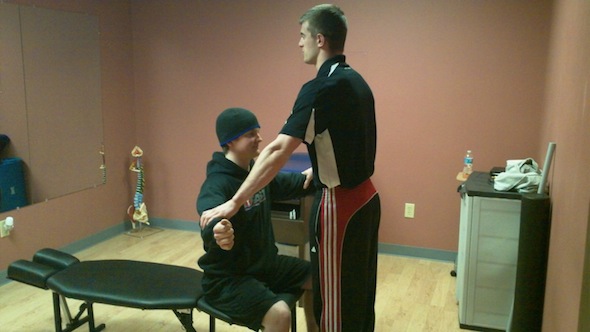 Manual muscle testing (MMT) can be a valuable tool in your assessment arsenal.
Manual muscle testing (MMT) can be a valuable tool in your assessment arsenal.
Now I know what the naysayers are going to say:
It’s not reliable enough.
It’s hard to use between testers.
And trust me, I agree with those sentiments. Like virtually any test in isolation, manual muscle testing is not perfect.
But as a strength coach or personal trainer, I feel there is some value in manual muscle testing.
One of the biggest issues you’re going to see when you starting coaching clients and athletes is that they all love to compensate.
But how are they going to cheat?
Manual muscle testing not only tells us if specific muscles have sufficient strength, but they also give us clues as to how a client will cheat or compensate.
Here’s a quick video to demonstrate all this:
Take a standard exercise like a chest supported row – it can’t get much simpler than that, right?
Lay on your stomach, grab the handles, and row away. It’s just that simple!
Until you actually watch people perform the exercise, that is.
I always tell my interns and coaches that we have to make sure we’re training the muscle or joint we’re trying to train.
It sounds simple, but it’s important.
If your goal is to teach someone to row, you’re trying to hit those mid-back muscles like the rhomboids, middle traps, lower traps, etc.
But we know that most people are horribly weak in this area.
Couple that with the need/desire to use more weight, and you have a recipe for compensation.
When clients are rowing, it’s very common to see any (or all) of the below compensations:
- Hyperextension of the lumbar spine.
- Anterior humeral glide/excessive shoulder extension.
- Protrusion of the head and neck.
Now that you have an idea of how you can use MMT to determine cheats and compensations, here’s another quick video on how to row effectively.
I hope this gives you an idea as to why we use MMT in our assessments. Quite simply, it’s not just an assessment of strength and/or joint stability.
And if you’d like to learn more about how we assess here at IFAST, consider attending our next Diagnosis Fitness course in April. You still have a few days to take advantage of the early-bird pricing!
Register Now for Diagnosis Fitness
All the best
Mike
